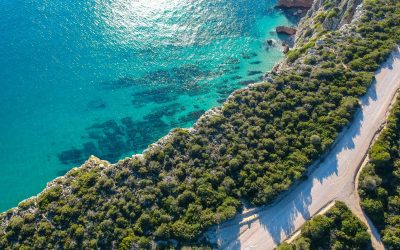Madeira, the breathtaking Portuguese island, continues to be a sought-after destination for American and Canadian retirees. Its stunning landscapes, mild climate, and vibrant community make it an ideal place to spend one’s golden years. However, as of January 1, 2024, Portugal has officially ended its Non-Habitual Resident (NHR) tax regime—a popular program that provided significant tax benefits for expatriates. This change has left many prospective retirees wondering how their finances and tax situations might be impacted.
While the NHR tax regime’s expiration marks the end of a particularly favourable period for retirees in Portugal, Madeira still offers numerous advantages, from affordable living costs to accessible healthcare. Moreover, with careful planning and expert guidance, those retiring in Madeira can enjoy tax-efficient strategies and a smooth immigration process.
At Madeira Corporate Services, we specialize in assisting American and Canadian citizens with their retirement plans. Whether you’re exploring the D7 Visa or the Golden Visa as an immigration pathway or need help navigating the new tax landscape, our experienced team is here to ensure a smooth transition.
Why Retire in Madeira?
1. A High Quality of Life
Madeira remains one of the most attractive places to retire, offering year-round pleasant weather, a safe environment, and a rich cultural heritage. Compared to many North American cities, the cost of living is still affordable, making it an ideal location for retirees seeking a better lifestyle without breaking the bank.
2. Healthcare and Social Security
Portugal offers high-quality healthcare services, accessible both publicly and privately. Retirees who obtain residency through the D7 or Golden Visa can enrol in the Portuguese healthcare system, which is both comprehensive and affordable.
Immigration Pathways to Madeira
For American and Canadian citizens looking into retiring in Madeira, two immigration pathways stand out: the D7 Visa and the Golden Visa. Both options remain unaffected by the NHR regime’s termination, offering clear routes to residency in Portugal.
3. The D7 Visa for Retirees
The D7 Visa continues to be the most accessible option for retirees with passive income streams. Initially designed for individuals who can demonstrate regular income, such as pensions, investments, or rental income, the D7 Visa remains popular due to its affordability and flexibility.
- Eligibility: Applicants must show sufficient income to sustain themselves in Portugal, which is generally tied to the Portuguese minimum wage. This threshold increases for family members who join the retiree.
- Application Process: The process starts with an application at a Portuguese consulate in the U.S. or Canada then securing a residency permit upon arrival in Portugal.
- Benefits: The D7 Visa allows retirees and their families to live in Madeira while maintaining access to public healthcare and other services. After five years, it can also lead to permanent residency or Portuguese citizenship.
How Madeira Corporate Services Can Help: We simplify the entire process, helping retirees (and digital nomads) gather the necessary documentation, apply for the D7 Visa, and transition smoothly to their new lives in Madeira.
4. The Golden Visa: Investment for Residency
For those interested in making a significant financial investment, the Golden Visa is another excellent pathway to residency. It is particularly attractive for individuals who prefer to invest in real estate or other qualifying projects in exchange for residency.
- Application Process: After the investment is made, the application for the Golden Visa is straightforward. The program is flexible regarding residency requirements, requiring just seven days of physical presence per year in Portugal.
- Benefits: Besides residency, Golden Visa holders can apply for permanent residency or citizenship after five years. They also gain visa-free access to the Schengen Area, making European travel easier.
How Madeira Corporate Services Can Help: Our team provides in-depth advice on the Golden Visa program, assisting with everything from real estate selection to the final residency application. We ensure that your investment meets the program’s criteria and that you receive all associated benefits.
Taxation in Madeira Post-NHR
With the end of the NHR tax regime, retirees must adapt to Portugal’s standard tax regulations. While the NHR offered significant tax exemptions on foreign income, the current tax system is still relatively competitive compared to many North American jurisdictions. Here’s what American and Canadian retirees need to know.
5. Portugal’s Standard Tax System
Without the NHR regime, retirees will now be subject to Portugal’s standard tax rates, ranging from 14.5% to 48% on personal income. While this might seem steep compared to NHR benefits, many retirees will find that effective tax planning can yield favourable outcomes.
- Pension Taxation: Pensions from the U.S. or Canada are now fully taxable under the standard regime in Portugal. However, tax credits and double taxation treaties between Portugal and North American countries can help mitigate the tax burden.
- Investment Income: Any income from dividends, interest, or rental properties is also subject to Portugal’s tax rates, but careful structuring and financial planning can optimize these liabilities.
How Madeira Corporate Services Can Help: Our team provides comprehensive tax advice to those retiring in Madeira, ensuring you understand your new obligations under Portugal’s tax laws. We work closely with international tax experts to help you structure your assets in the most tax-efficient way while also considering any commitments you may have in the U.S. or Canada.
6. Double Taxation Treaties with the U.S. and Canada
The U.S.-Portugal and Canada-Portugal tax treaties prevent double taxation, ensuring that retirees do not pay tax on the same income in both countries. These treaties are crucial for retirees drawing pensions from their home country or receiving income from investments abroad.
How Madeira Corporate Services Can Help: We guide our clients through the complexities of these treaties, ensuring that they take full advantage of the available tax credits and exemptions. We’ll help you navigate filing requirements both in Portugal and back home in North America.
How Madeira Corporate Services Supports Your Retirement
Moving to a new country involves navigating complex immigration, legal, and tax systems. At Madeira Corporate Services, we offer tailored support for American and Canadian citizens looking to retire in Madeira, ensuring a seamless transition and helping you adapt to the post-NHR tax environment.
7. Expert Immigration Assistance
Whether you’re pursuing the D7 Visa or the Golden Visa, our team provides end-to-end immigration services, handling everything from paperwork to liaising with Portuguese authorities.
8. Tax Planning and Compliance
Our specialists help retirees optimize their tax strategy under Portugal’s standard tax regime. We ensure compliance with Portuguese and North American tax laws, avoiding pitfalls like double taxation.
9. Real Estate and Investment Advice
For those opting for the Golden Visa, we offer expert guidance on real estate investment in Madeira, ensuring that your purchase meets the Golden Visa criteria and serves as a sound financial investment.
10. Ongoing Support
Even after settling in Madeira, our team remains available to assist those retiring in Madeira with legal services, annual tax filings, and other administrative needs, allowing you to enjoy your retirement without hassle.
Frequently Asked Questions (FAQs)
11. What tax benefits are available after the NHR regime ends?
Although the NHR regime has ended, retirees can still benefit from double taxation treaties and careful tax planning to minimize liabilities under Portugal’s standard tax system.
12. How is my pension taxed in Portugal now?
Pensions are taxed according to Portugal’s standard income tax rates. However, tax treaties with the U.S. and Canada may allow you to reduce or offset some of your tax obligations.
13. Is the Golden Visa still a good option for retirees?
Yes, the Golden Visa remains a strong option for investment-based residency. It offers flexibility and the opportunity to obtain permanent residency or citizenship after five years.
14. How does the D7 Visa differ from the Golden Visa?
The D7 Visa is based on passive income (e.g., pensions, investments), while the Golden Visa requires a financial investment (e.g., creating job posts or investing funds). Both provide a pathway to permanent residency, but the Golden Visa offers more flexibility regarding physical presence in Portugal.
15. Can I still receive U.S. or Canadian pensions while living in Madeira?
Yes, retirees can receive pensions from their home country while residing in Madeira. However, it would help if you accounted for how these pensions are taxed under Portuguese law.
16. How long does it take to get residency through the D7 or Golden Visa?
The D7 Visa typically takes three to six months from application to approval. The Golden Visa process can take over 12 months, depending on the investment and paperwork.
Conclusion
While ending the NHR tax regime may seem like a setback, retiring in Madeira still offers many benefits for American and Canadian citizens. With proper planning and guidance, you can enjoy a smooth transition, favourable tax strategies, and the island’s exceptional quality of life. Madeira Corporate Services is here to help you every step of the way—from immigration assistance to expert tax planning.
The information in this article on “retiring in Madeira” is for general informational purposes only and is not intended to constitute legal advice. While every effort has been made to ensure the accuracy of the content, laws and legal procedures can change, and the specifics of each case can vary widely. Therefore, readers are advised to consult a qualified professional or attorney in Portugal for advice tailored to their circumstances before taking action. This article does not create an attorney-client relationship between the reader, the authors, or the publishers. The authors and publishers are not liable for any actions taken or not taken based on the content of this article.
The founding of Madeira Corporate Services dates back to 1996. MCS started as a corporate service provider in the Madeira International Business Center and rapidly became a leading management company… Read more




